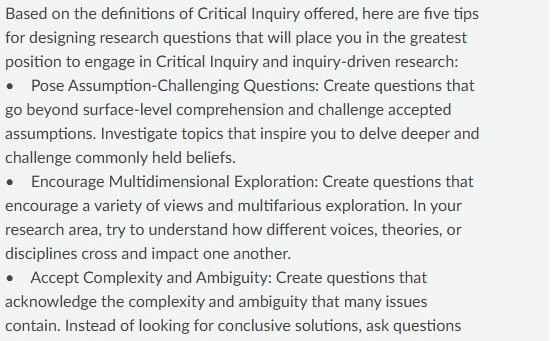Assignment 11: An encounter with the research process
THINK ABOUT RESEARCH QUESTIONS
First, to learn about what kinds of research questions best drive scholarly inquiry, read these College Composition instructors’ definitions of Critical Inquiry, Download College Composition instructors’ definitions of Critical Inquiry,or the process of inquiry-driven research.
Drawing from the definitions that resonate most with you, develop five guidelines for what kinds of questions best position you to engage in Critical Inquiry/inquiry-driven research.
crowdsource guidelines
Step 1: Post your five guidelines to the discussion below.
Step 2: Then, read your peers’ guidelines, and write a second post in which you revise your guidelines based on those of your peers. Write one detailed paragraph explaining your revisions/final choices.
Step 3: Drawing on your revised guidelines, post a provisional version of the question that you would like to research for the remainder of the semester. IMPORTANT: your question should to grow out of your response to McCloud’s essay and the essay that you chose to read for the previous assignment. In this way, McCloud’s essay and the essay you chose will serve as springboards for your research, though at this stage, your question is provisional, and you may choose to revise it as your research progresses). If you’d like to get sense of where your peers are headed, check out their responses!
Assignment 11: An encounter with the research process-Read And watch
Now that you have a draft research question, the next step is to learn about what you’ll need to do to respond to that question.
FROM CRITICAL READING, CRITICAL WRITING: A HANDBOOK TO UNDERSTANDING COLLEGE COMPOSITION:
- Read “Academic inquiry and developing a research question”Links to an external site. and “Finding and Using Outside SourcesLinks to an external site..” As you read, annotate the text using the methods discussed earlier in the semester, and try to remember the various procedures for searching because you will make use of them in the next assignment.
Answer Preview-Assignment 11: An encounter with the research process-ENGL-121-N201

